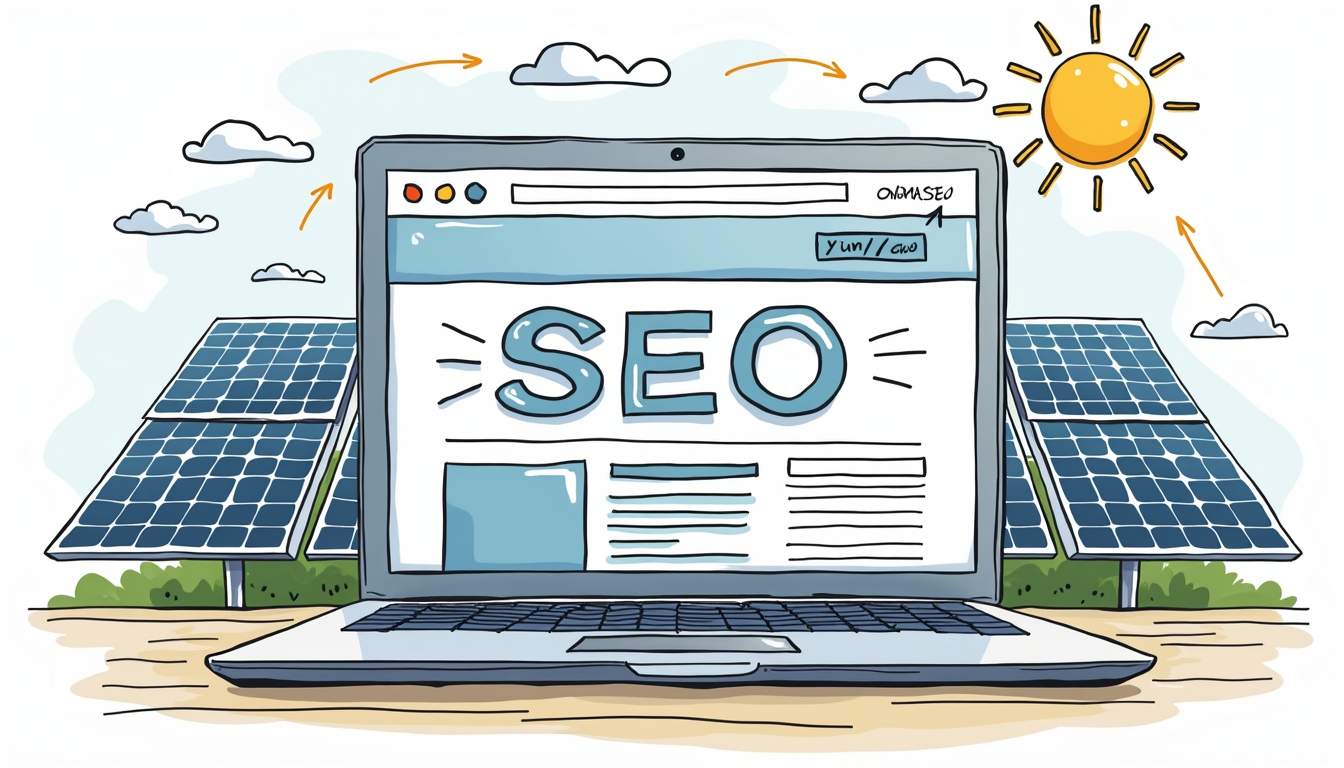In today’s competitive renewable energy market, solar rooftop companies need more than just quality installations to stand out. With homeowners and businesses increasingly searching online for solar solutions, a robust SEO strategy has become essential for solar companies looking to capture leads and grow their customer base. This comprehensive guide will walk you through the specific SEO strategies that can help your solar rooftop business climb the search rankings and shine brighter than the competition.
Understanding the Solar Industry SEO Landscape
The solar industry presents unique SEO challenges and opportunities. Unlike many other sectors, solar companies must balance technical product information with educational content while addressing specific regional factors that affect solar adoption. Before diving into tactics, it’s important to understand what makes solar SEO different.
Solar-Specific Search Behavior
Solar customers typically follow a longer research journey than many other purchases. They often start with educational queries like “solar panel benefits” or “how much can I save with solar,” before progressing to more purchase-oriented searches such as “solar installation companies near me.” This extended customer journey means your SEO strategy needs to capture potential customers at various stages of awareness and consideration.
Data from Google Trends shows that searches for solar-related terms often spike seasonally, with increased interest during spring and early summer months when homeowners are more likely to consider home improvements. Understanding these patterns can help you time your content and advertising pushes for maximum impact.
Local vs. National SEO Considerations
Solar installation is inherently local, making local SEO crucial for rooftop solar companies. However, educational content about solar technology and benefits can rank nationally. Your strategy needs to balance both approaches, capturing local installation leads while building broader brand authority through informational content.
Keyword Research for Solar Companies
Effective keyword research forms the foundation of any successful SEO campaign. For solar companies, this means identifying terms that potential customers use throughout their solar buying journey.
High-Value Solar Keywords
Start by targeting high-intent keywords that indicate a readiness to purchase, such as “solar panel installation [city name],” “solar company near me,” or “best solar installers [location].” These terms typically have higher conversion rates, though they may also face stiffer competition from other solar companies.
Don’t overlook long-tail keywords that address specific customer questions like “how many solar panels for a 2000 sq ft home” or “solar panel payback period in [state].” These longer queries often have less competition while attracting highly engaged prospects.
Localized Keyword Targeting
Solar incentives, regulations, and even sunlight hours vary dramatically by location. Create location-specific content that addresses these regional factors. Keywords like “California solar rebates,” “solar net metering in Arizona,” or “best solar panels for snowy climates” can help you connect with customers in your service areas while addressing their specific concerns.
Competitor Keyword Analysis
Tools like Semrush, Ahrefs, or Moz can help you identify which keywords your competitors are ranking for. Look for gaps in their coverage that represent opportunities for your business. Perhaps they’re neglecting commercial solar installations, specific panel types, or battery storage solutions that you could target.
On-Page SEO for Solar Websites
Once you’ve identified your target keywords, you’ll need to optimize your website to rank for them. On-page SEO involves strategically incorporating these keywords while creating valuable content that answers potential customers’ questions.

Creating Conversion-Focused Service Pages
Your core service pages should be optimized for commercial intent keywords. For example, your “Residential Solar Installation” page should include details about your process, the equipment you use, financing options, and clear calls to action. Include your primary keywords in the page title, headings, URL, and naturally throughout the content.
Use schema markup to help search engines understand your business type, service areas, and other relevant information. LocalBusiness and Service schema types are particularly valuable for solar companies, as they can help your business appear in rich results and local packs.
Content Marketing for Solar Companies
Content marketing allows you to target informational queries while establishing your company as an authority in the solar space. A well-executed content strategy can capture potential customers early in their research phase and guide them toward choosing your company when they’re ready to install.
Educational Blog Content
Create comprehensive guides addressing common questions about solar energy. Topics like “Solar Panel ROI Calculator: Is Solar Worth It in [Your State]?” or “Monocrystalline vs. Polycrystalline Solar Panels: Which is Right for Your Home?” can attract potential customers early in their research phase.
Use your blog to address common objections to going solar, such as upfront costs, aesthetic concerns, or uncertainty about the installation process. By proactively addressing these issues, you can help move prospects closer to a purchasing decision.
Case Studies and Success Stories
Showcase your successful installations with detailed case studies that include specific data points like system size, energy production, cost savings, and payback periods. These real-world examples not only build trust with potential customers but also provide opportunities to target keywords related to specific neighborhoods, home types, or energy needs.
Technical SEO for Solar Websites
Technical SEO ensures that search engines can effectively crawl, index, and understand your website. For solar companies, several technical factors deserve special attention.

Mobile Optimization
With over 60% of searches now occurring on mobile devices, your solar website must provide an excellent mobile experience. Ensure that your site uses responsive design, loads quickly on mobile connections, and that important elements like contact forms and quote calculators work seamlessly on smaller screens.
Google’s mobile-first indexing means that the mobile version of your site is now what Google primarily uses for indexing and ranking. Use Google’s Mobile-Friendly Test to identify and fix any mobile usability issues.
Local SEO for Solar Installers
Since solar installation is a local service, optimizing for local search is critical for generating qualified leads.
Google Business Profile Optimization
Claim and optimize your Google Business Profile (formerly Google My Business) listing. Include your complete business information, service areas, business hours, and high-quality photos of your installations. Encourage satisfied customers to leave positive reviews, and respond promptly to all reviews, both positive and negative.
Use Google Posts to highlight special offers, recent installations, or educational content from your website. These posts appear directly in your Business Profile and can help drive engagement with potential customers searching for solar solutions in your area.
Local Link Building
Build relationships with local businesses, chambers of commerce, and sustainability organizations to earn valuable local backlinks. Sponsoring community events, participating in home shows, or joining local green business directories can all generate quality links while increasing your visibility in the community.
Local news coverage of your installations, especially for notable projects like municipal buildings or schools, can provide authoritative backlinks while building brand awareness in your service area.
Measuring Solar SEO Success
Tracking the right metrics will help you refine your SEO strategy and demonstrate ROI to stakeholders.

Key Performance Indicators
Beyond standard SEO metrics like rankings and organic traffic, solar companies should track conversion metrics such as quote requests, solar calculator uses, and consultation bookings. Set up goal tracking in Google Analytics to monitor these actions and attribute them to specific keywords and content pieces.
Track your customer acquisition cost from organic search and compare it to other channels like paid advertising or referrals. This data can help you allocate marketing resources more effectively and demonstrate the value of your SEO investments.
With these strategies in place, your solar rooftop company can build a powerful online presence that generates a steady stream of qualified leads. Remember that SEO is a long-term investment – consistency and patience are key to seeing results. As the solar industry continues to grow, companies that establish strong search visibility now will be well-positioned to capture market share for years to come.




